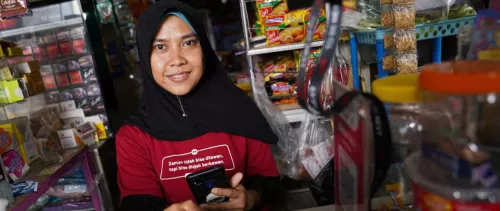
Photo: Starmarpro/Adobe Stock (Generated with AI)
In May 2023, a World Bank team visited Secunda, a South African town defined by Sasol’s unique commercial coal-to-liquids facility, to participate in a workshop on just green transition in Mpumalanga’s coal-rich region. During the workshop, diverse voices from community leaders and global experts discussed the monumental challenges of a green transition, a conversation echoing far beyond the borders of this small town.
In these discussions, one thing became crystal clear: this transition is more than a simple technological swap from coal to green energy sources. It’s a narrative deeply rooted in human stories – involving livelihoods, communities, and an entire generation at a historical juncture.
And aren’t we at a similar crossroads with Artificial Intelligence (AI)? Like climate change, AI represents another major shift that we must navigate collaboratively. These two shifts together will redefine our world in ways we are only beginning to understand.
Our experience addressing the climate transition offers crucial insights for the ongoing AI governance discussion. The key justice principles—distributive, procedural, and recognition—that guide climate action also apply to the AI transition.
“This transition is more than a simple technological swap from coal to green energy sources. It’s a narrative deeply rooted in human stories – involving livelihoods, communities, and an entire generation at a historical juncture.”
How can we make the AI transition fair and inclusive?
Tackling climate change is not just about technology or finance; it’s fundamentally about people. For instance, in South Africa, coal-dependent communities are worried about their future, faced with unprecedented changes to their livelihoods and social cohesion. Here are three ways that we can ensure everyone is included:
1. Empowering through training and skilling
Implementing a proactive strategy for economic diversification, along with livelihood support and skills training, can transform challenges into opportunities – particularly if communities are steering this change. This is what we call “distributive justice”: turning the downsides of major shifts into new opportunities for those who stand to lose the most. A similar principle could also be applied to artificial intelligence. Goldman Sachs warns that AI tools, such as ChatGPT, could replace nearly one-fifth of jobs worldwide. During previous cycles of autonomation, blue-collar workers lost their jobs. Now, white-collar workers, particularly women, are vulnerable, as AI excels at cognitive tasks, fundamental to office work.
Following a distributive justice model, employees could be trained to manage AI systems, thereby boosting their productivity. A recent study with the Boston Consulting Group showed consultants using AI completed 12.2% more tasks, 25.1% faster, with 40% higher quality results than those without AI. The study also highlighted AI as a skill leveler, with the initially lowest-scoring consultants experiencing a 43% performance boost when using it.
Currently, it’s estimated that only 1 in 8 workers globally have the necessary green skills, despite the sector’s employment of over 67 million in 2022, and 90% of women lack these skills. Collaborative efforts from governments, industries, and educational institutions are essential to bridge this gap.
Addressing AI skills development is key for distributive justice. Programs like Microsoft’s AI Skills Initiative are providing vital AI training to diverse populations, and AI-enhanced education can democratize top-tier learning, mitigating brain drain and boosting talent markets in developing economies.
2. Ensuring inclusivity by hearing every voice
This is what we got to witness in Secunda, and, more broadly, we work to ensure that communities are heard and are part of the designing of climate solutions like climate resilient infrastructure or extraction of green minerals. Moreover, AI and machine learning technologies can boost citizen engagement by rooting climate interventions in community experiences, and their use in climate finance directs funds to impactful projects, ensuring transparency and ‘green’ accountability.
In the AI transition impacting jobs, healthcare, and education, it’s essential to include diverse voices in governance to ensure broad benefits. Inclusivity in AI also entails enhancing community engagement and proficiency to safeguard trust and information integrity, vital in areas like climate justice.
3. Upholding dignity and equity for marginalized communities
Respecting the rights and values of diverse societal groups is also crucial in ‘just transitions,’ both climate and AI. This highlights the dignity of every individual and addresses unique challenges faced by marginalized communities, and is precisely what we focus on in our work on social dimensions of climate change. We highlight how climate impacts disproportionately affect womenand marginalized groups like Indigenous Peoples, further deepening societal inequalities. Emphasizing the importance of community engagement, we advocate for leveraging local knowledge to co-design effective, tailored solutions for climate mitigation and adaptation.
Researchers have uncovered instances of AI perpetuating algorithmic bias, such as facial recognition errors with certain racial and ethnic groups and AI resume-screening tools showing gender discrimination due to male-dominated training data. Addressing these issues calls for applying recognition justice principles.
Towards a just and sustainable future in the AI era
It’s crucial that our technological advancements not only uphold justice principles but also prioritize environmental sustainability, tackling the ecological impacts of increased computing essential for AI expansion.
We continue to learn valuable lessons from our journey towards a more livable planet. Now, as we embrace the AI revolution, let’s apply the relevant lessons. In this new world of green practices and AI, together we can foster an environment where we all thrive collectively, united by principles of justice and fairness.


